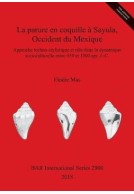Google Books previews are unavailable because you have chosen to turn off third party cookies for enhanced content. Visit our cookies page to review your cookie settings.
Étude archéozoologique des grands mammifères du gisement Paléolithique moyen d’Érd (Hongrie) (Paperback)
Imprint: British Archaeological Reports
Pages: 218
Illustrations: Illustrated throughout in colour and black & white
ISBN: 9781407313412
Published: 19th January 2015
Script Academic & Professional
Pages: 218
Illustrations: Illustrated throughout in colour and black & white
ISBN: 9781407313412
Published: 19th January 2015
Script Academic & Professional
You'll be £15.00 closer to your next £10.00 credit when you purchase Étude archéozoologique des grands mammifères du gisement Paléolithique moyen d’Érd (Hongrie). What's this?
+£4.99 UK Delivery or free UK delivery if order is over £40
(click here for international delivery rates)
Need a currency converter? Check XE.com for live rates
(click here for international delivery rates)
Need a currency converter? Check XE.com for live rates
This work deals with Neanderthal subsistence behaviours during the Middle Palaeolithic in Hungary, through the example of Érd site. Very discreet, hunting and mainly scavenging, activities are shown by zooarchaeological study for meat procurement. This is different for carnivores, except for cave bears. The latter, using the place for hibernation, meant a high number of their remains are associated with “Charentian” lithic industry and with those of cave hyena. This carnivore has a significant impact on bone accumulations, herbivores and bears, and shows signs of cannibalism on its congener’s remains. Human activities are visible only on a few bones belonging to large ungulates and cave bear. However, no proof supports the proposition of a clear specialization in cave bear hunting on acquiring meat resources (as written by V. Gábori Csánk in the monography on Érd published in 1968); a contrario, on scavenging carcasses and/or visiting (actively?) dens for weakened wintering/hibernating bears. These results attest the contemporaneity of a part of the bear carcasses with human installation or presence on the site.
Other titles in British Archaeological Reports...













